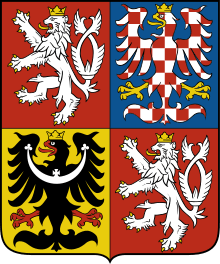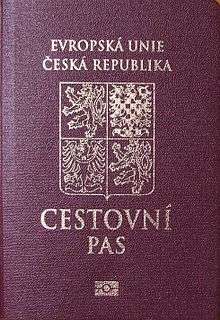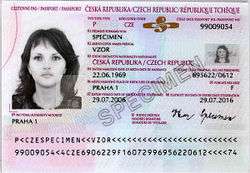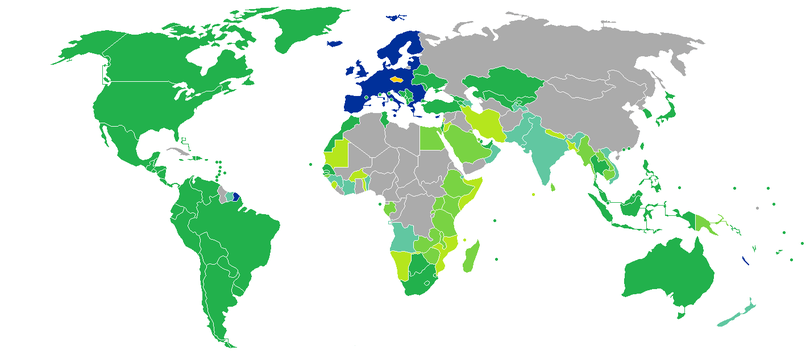Czech nationality law
The citizenship law of the Czech Republic is based on the principles of jus sanguinis or "right by blood".[1] In other words, descent from a Czech parent is the primary method of acquiring Czech citizenship (together with naturalization). Birth on Czech territory without a Czech parent is in itself insufficient for the conferral of Czech citizenship. Every Czech citizen is also a citizen of the European Union. The law came into effect on 1 January 1993, the date of the dissolution of Czechoslovakia, and has been amended in 1993, 1995, 1996, 1999, 2002, 2003, and 2005. Since 1 January 2014, multiple citizenship under Czech law is allowed.[2][3]
| Czech Citizenship Act | |
|---|---|
 | |
| Parliament of Czech Republic | |
Long title
| |
| Enacted by | Parliament of the Czech Republic |
| Passed | 26 June 2013 |
| Enacted | 1 January 2014 |
| Signed by | President Miloš Zeman |
| Legislative history | |
| Introduced by | Ministry of the Interior |
| First reading | 4 December 2012 |
| Second reading | 20 March 2013 |
| Third reading | 27 March 2013 |
| Repeals | |
| Act No. 186/2013 Coll., on Acquiring and Losing Citizenship of the Czech Republic | |
| Status: Current legislation | |
Acquisition
Citizenship by birth

The principle of jus sanguinis is used to determine eligibility for citizenship, as is typical in Europe. In principle, any person born to a Czech citizen is a Czech citizen at birth. If both grandparents on someone's maternal lineage or paternal lineage, Czech nationality will be transmitted down to the family lineage up till grandchildren. Whether a person is born in the Czech Republic or elsewhere is irrelevant. Where only the father is Czech, and the parents are unmarried, proof of paternity is required – by the parents making a concerted declaration before the Registry Office or a court, submission of a DNA test, or a court determination relating to the paternity of the child.
Children born in the Czech Republic to non-Czech parents do not acquire Czech citizenship unless:
- the parents are stateless; and
- at least one parent is a permanent resident of the Czech Republic
Children aged less than 15 years found on the territory of the Czech Republic (where identity of the parents cannot be established) are deemed to be Czech citizens.[4]
Naturalisation
Resident foreigners or stateless persons who have held a right of permanent residence for at least five years (reduced to three years for EU citizens) and have resided in the Czech Republic for most of that time can apply for Czech naturalization if they can prove they are of good character and are proficient in the Czech language (current or former Slovak citizens are exempt from language requirements). Parents can apply for their children under 15 years of age, and naturalization occurs at the discretion of the Interior Ministry.
The residence requirement can be waived if the person has a permanent residence permit and
- Has lived there for at least 10 years continuously, or
- Was born on the territory of the Czech Republic, or
- Has held Czech or Czechoslovak citizenship before, or
- At least one of his or her parents is a Czech citizen, or
- Was adopted by a Czech citizen, or
- His or her spouse is a Czech citizen, or
- Is under 18 years of age, or
- Is stateless or has refugee status in the Czech Republic.[5]
Declaration
If a person was a citizen of the Czech and Slovak Federative Republic as of 31 December 1992, he may declare citizenship of either the Czech Republic or Slovakia (gaining Slovak citizenship) assuming he does not have any other citizenship. The Slovak provision allowing for this grant expired in 1993, however the Czech equivalent remains in the citizenship law.
Emigrants
During the communist era (1948–89) hundreds of thousands of Czechoslovakian citizens had emigrated into other parts of the West. The regime punished emigration by removing Czechoslovak citizenship, along with property confiscation and in absentia prison sentences. Since the Velvet Revolution in 1989, many emigrants demanded their citizenship be restored. Between 1999 and 2004, a special measure allowed them to regain the citizenship,[6] but a few people took advantage of the wording, which "granted" citizenship rather than "restored" it and so got dual citizenship. A few people from Volhynia and Romania also got citizenship.
Loss of citizenship

Involuntary
The involuntary loss of citizenship is constitutionally prohibited. However, before the 2013 Citizenship Act (effective as of 1 January 2014) it was sometimes argued by emigrants and emigrant groups that the restrictions on dual citizenship were a form of involuntary deprivation of citizenship.[7]
Voluntary (restrictions on dual citizenship)
Czech citizenship can be renounced voluntarily if doing so wouldn't cause one to be stateless unless it is in connection with a marriage or by birth – the Czech Republic does not require children born with another nationality to renounce it upon reaching maturity.
Waiving the requirements
The Czech Ministry of Interior can waive all citizenship requirements if the person cannot be released from the original citizenship, if the other state refuses to issue confirmation of the loss of citizenship, if the loss of foreign citizenship would result in persecution, if it is in the political interests of the Czech Republic, or if the applicant has resided on the territory of what is today the Czech Republic for at least twenty years.
Proof of citizenship
Czech citizenship can be proved by
- A national identification card (občanský průkaz) (mandatory for those over 15 years of age),
- A travel document; e.g. a Czech passport,
- A certificate of Czech citizenship (CCC) issued by the Ministry of the Interior that is less than 12 months old since the date of issuance,[8]
- A Czech marriage certificate, but only if the citizenship details are included.
Dual citizenship
Czech Republic allows its citizens to hold foreign citizenship in addition to their Czech citizenship since 2014. The Czech government maintains a registry of those nationals who hold a concurrent nationality in addition to their Czech nationality.
Some countries, however, do not permit multiple citizenship e.g. adults who acquired Czech and Japanese citizenship by birth must declare, to the latter's Ministry of Justice, before turning 22, which citizenship they want to keep.
Citizenship of the European Union
Because Czech Republic forms part of the European Union, Czech citizens are also citizens of the European Union under European Union law and thus enjoy rights of free movement and have the right to vote in elections for the European Parliament.[9] When in a non-EU country where there is no Czech embassy, Czech citizens have the right to get consular protection from the embassy of any other EU country present in that country.[10][11] Czech citizens can live and work in any country within the EU as a result of the right of free movement and residence granted in Article 21 of the EU Treaty.[12]
Travel freedom of Czech citizens

Visa requirements for Czech citizens are administrative entry restrictions by the authorities of other states placed on citizens of Czech Republic. As of May 2018, Czech citizens had visa-free or visa on arrival access to 182 countries and territories, ranking the Czech passport 7th in terms of travel freedom (tied with Maltese and New Zealand passports) according to the Henley Passport Index.[13]
In 2017, The Czech nationality is ranked fifteenth in Nationality Index (QNI). This index differs from the Visa Restrictions Index, which focuses on external factors including travel freedom. The QNI considers, in addition, to travel freedom on internal factors such as peace & stability, economic strength, and human development as well. [14]
See also
- Slovak nationality law
References
- Baršová, Andrea. "Country Report: Czech Republic" (PDF). Euro Citizenship.
- Consular information on dual citizenship, Consulate General of the Czech Republic, New York
- Consular information on dual citizenship, Consulate General of the Czech Republic, Toronto
- Refugees, United Nations High Commissioner for. "Refworld | Czech Republic: Act No. 40/1992 on the Acquisition and Loss of Citizenship of the Republic (repealed)". Refworld. Retrieved 9 January 2020.
- "Udělení státního občanství České republiky". Ministerstvo vnitra České republiky. Retrieved 18 November 2019.
- "Navracení občanství Čechoameričanům - Krajane.net" (in Czech). Krajane.radio.cz. 28 January 2009. Archived from the original on 11 February 2008. Retrieved 13 June 2012.
- "Dual Citizenship Duel – soc.culture.czecho-slovak | Google Groups". Groups.google.com.au. Retrieved 13 June 2012.
- https://www.mzv.cz/toronto/en/visa_and_consular_services/certificate_of_citizenship/index_7.html
- "Czech Republic". European Union. Archived from the original on 11 May 2015. Retrieved 4 May 2015.
- Article 20(2)(c) of the Treaty on the Functioning of the European Union.
- Rights abroad: Right to consular protection: a right to protection by the diplomatic or consular authorities of other Member States when in a non-EU Member State, if there are no diplomatic or consular authorities from the citizen's own state (Article 23): this is due to the fact that not all member states maintain embassies in every country in the world (14 countries have only one embassy from an EU state). Antigua and Barbuda (UK), Barbados (UK), Belize (UK), Central African Republic (France), Comoros (France), Gambia (UK), Guyana (UK), Liberia (Germany), Saint Vincent and the Grenadines (UK), San Marino (Italy), São Tomé and Príncipe (Portugal), Solomon Islands (UK), Timor-Leste (Portugal), Vanuatu (France)
- "Treaty on the Function of the European Union (consolidated version)" (PDF). Eur-lex.europa.eu. Retrieved 10 July 2015.
- "Global Ranking – Passport Index 2018" (PDF). Henley & Partners. Retrieved 22 May 2018.
- "The 41 nationalities with the best quality of life". www.businessinsider.de. 6 February 2016. Retrieved 10 September 2018.
External links
- Ministry of the Interior of the Czech Republic
- Full amended text of 40/1993 Sb. as of 2005 (in Czech)
- Ministry of Internal Affairs page on the citizenship law (in Czech)
- new (2013) Citizenship Act (in Czech)
- (PDF) new (2013) Citizenship Act (in Czech)
- Ministry of Interior information site (in Czech)